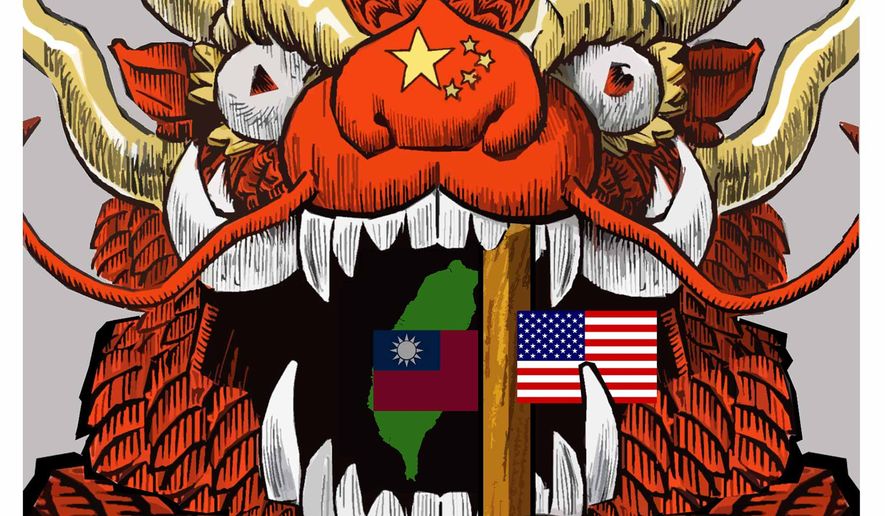OPINION:
President Biden’s recent statement that the United States would intervene militarily if China tries to take Taiwan by force was hardly a gaff. White House denials notwithstanding, the U.S. policy of strategic ambiguity regarding Taiwan is long past its pull date.
When then-President Richard Nixon went to China and opened the dialogue that ultimately normalized the People’s Republic diplomatic relations in 1978 and trade relations in 2000, the U.S. officially recognized only one China. Washington opposes Beijing reuniting Taiwan through force, but has been purposefully ambiguous about whether it would intervene militarily if China invaded.
Per the 1979 Taiwan Relations Act, the U.S. provides Taiwan with defensive weapons but withholds an ironclad assurance that America would rush to its defense.
This had two objectives: First to discourage Taiwan from taking a provocative act like declaring its independence. Second, to avoid antagonizing Beijing to cross the straits or take wider aggressive actions in the South and Western Pacific.
In response to a controversy concerning a sculpture at the London School of Economics depicting Taiwan as part of China in 2019, President Tsai Ing-wen asserted Taiwan is a sovereign and independent state. Short of renting Independence Hall and sending President Xi Jinping a letter signed with a quill on parchment, it doesn’t get much clearer than that.
China has hardly been restrained in its military buildup, efforts to intimidate Taiwan and its neighbors in the Pacific or preparations for an invasion if it becomes so disposed.
For the United States, the Taiwan challenge is multifaceted and global. Taiwan and Ukraine both have great strategic significance.
America, by ceding control of the Black Sea and Ukrainian ports, permits Russia a chokehold on the global swing supplier of wheat and several other key agricultural commodities. Moscow has the capacity to create instability throughout the developing world with skyrocketing food prices and shortages.
Sanctions are working — that is Moscow’s sanctions — because the U.S. and its allies have been needlessly intimidated by its threats to deploy chemical or nuclear weapons.
Similarly, the U.S. is compelling Kyiv to ward off an army superior in numbers and equipment force absurd conditions. The Russians can bomb Ukrainian cities and civilians at will, but Ukrainian forces are not permitted to strike targets inside Russia.
Mr. Biden has made plain the U.S. won’t commit American forces unless those are attacked.
Taiwan provides the world with 92% of the global supply chain’s advanced semiconductors. Consequently, a Chinese invasion or even a blockade would bring Western economies to their knees within months.
Taiwan’s defense spending has fallen from 5.2% to about 2% of GDP since 1990, too many of the weapons it has purchased won’t be useful in an invasion and its reserves are hardly in the state of readiness that the Ukrainian army has proven to be.
U.S. policymakers insist on seeing the fight with Russia in Ukraine or China in Taiwan in local terms but in both places, the adversary enjoys the manifest advantages of proximity.
The military literature indicates that the U.S. Navy and Air Force would face great challenges supplying Taiwan now that China has modernized and expanded its forces.
Saying to Beijing unambiguously, cross the straits and America will defend the island state is foolish — American forces would likely get their butts kicked.
Instead, tell Beijing: Cross the straits and China is in a global war with the U.S. Navy, and be prepared to sink Beijing’s dreams of Pacific glory within a week. Thoughtful plans have been offered for such a capability by former President Barack Obama’s Under Secretary of Defense Michele Flournoy, but Secretary of Defense Lloyd Austin has failed to offer a credible strategy.
Even the most appropriate statement of policy and realignment of American forces rings hollow when in Europe, where the U.S. enjoys superiority, it refuses to even permit its surrogate to take the fight to the Russians.
In addition to replacing Mr. Austin with someone like Ms. Flournoy and financing a transformation of forces in the Pacific, the U.S. can best avoid an invasion of Taiwan by standing up to Russia now.
That should begin with the United States through NATO or another coalition of willing nations, providing naval escorts for Ukrainian exports to break the Russian blockade and providing Kyiv with offensive weapons.
Make it plain that if Russia resorts to its much bandied nuclear, chemical, hypersonic missiles and other asymmetrical weapons or so much as plucks the hair from the head of a single allied soldier, the U.S. Navy would sink the Russian Navy and commercial vessels wherever they sail.
We need to clarify our strategy and revitalize our forces in the Pacific, but those won’t keep the peace if Russian President Vladimir Putin cows Mr. Biden in Europe.
• Peter Morici is an economist, emeritus business professor at the University of Maryland, and national columnist.




Please read our comment policy before commenting.